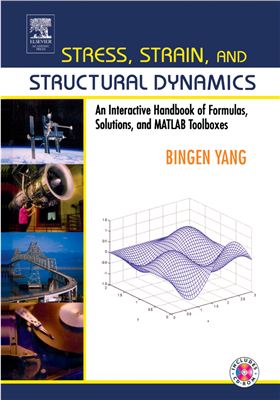Elsevier Academic Press, 2005. 960 p. ISBN:0127877673
Stress, Strain, and Structural Dynamics is a comprehensive and definitive reference to statics and dynamics of solids and structures, including mechanics of materials, structural mechanics, elasticity, rigid-body dynamics, vibrations, structural dynamics, and structural controls. This text integrates the development of fundamental theories, formulas and mathematical models with user-friendly interactive computer programs, written in the powerful and popular MATLAB. This unique merger of technical referencing and interactive computing allows instant solution of a variety of engineering problems, and in-depth exploration of the physics of deformation, stress and motion by analysis, simulation, graphics, and animation.
This book is ideal for both professionals and students dealing with aerospace, mechanical, and civil engineering, as well as naval architecture, biomechanics, robotics, and mechtronics. For engineers and specialists, the book is a valuable resource and handy design tool in research and development. For engineering students at both undergraduate and graduate levels, the book serves as a useful study guide and powerful leaing aid in many courses. And for instructors, the book offers an easy and efficient approach to curriculum development and teaching innovation.
Stress, Strain, and Structural Dynamics is a comprehensive and definitive reference to statics and dynamics of solids and structures, including mechanics of materials, structural mechanics, elasticity, rigid-body dynamics, vibrations, structural dynamics, and structural controls. This text integrates the development of fundamental theories, formulas and mathematical models with user-friendly interactive computer programs, written in the powerful and popular MATLAB. This unique merger of technical referencing and interactive computing allows instant solution of a variety of engineering problems, and in-depth exploration of the physics of deformation, stress and motion by analysis, simulation, graphics, and animation.
This book is ideal for both professionals and students dealing with aerospace, mechanical, and civil engineering, as well as naval architecture, biomechanics, robotics, and mechtronics. For engineers and specialists, the book is a valuable resource and handy design tool in research and development. For engineering students at both undergraduate and graduate levels, the book serves as a useful study guide and powerful leaing aid in many courses. And for instructors, the book offers an easy and efficient approach to curriculum development and teaching innovation.

